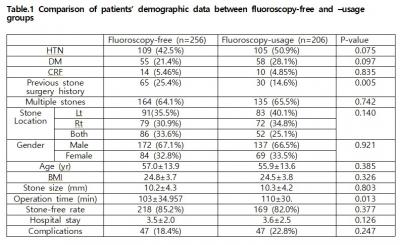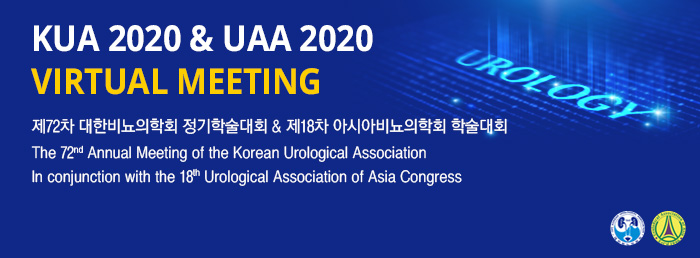|
Endourology & Stone Disease(구연)
|
(E-161)
|
|
The efficacy and safety of radiation-free retrograde intrarenal surgery
|
¹경북대학교 의과대학 비뇨의학과 교실
²경북대학교 병원 비뇨의학과
³칠곡 경북대학교 병원 비뇨의학과 |
| 이승윤², 강재훈³, 민경찬², 정재욱³, 이준녕¹³, 김범수¹² |
Purpose: Traditionally, retrograde intrarenal surgery (RIRS) has been performed under the fluoroscopy guidance. Although fluoroscopy is necessary for safe and smooth procedure of RIRS, there is an increasing concern regarding the hazards of frequent radiation exposure to patients and surgeons. Thus, we established a technique for radiation-free RIRS and retrospectively evaluated the efficacy and safety of radiation-free RIRS for management of renal stone.
Materials and methods: From January 2015 to December 2019, 462 patients who underwent RIRS for unilateral renal stone less than 2cm were enrolled in this study. The data was collected retrospectively and the patients were divided into two groups according to the usage of fluoroscopy during surgery. The patients’ demographic data, operation time, hospital stay, complications, and stone-free rate (SFR) were compared between fluoroscopy-free and -usage groups.
Results: Of 462 patients, the initial consecutive 206 patients underwent RIRS under fluoroscopy guidance, and the other 256 consecutive patients underwent RIRS without fluoroscopy. The patients and stones characteristics were not statistically different between the two groups. Mean operation time was significantly shorter in fluoroscopy-free group (103±33.9 vs 110±30.6 minutes, p=0.022), while mean hospital stay (3.5±2.0 vs 3.6±2.5, p=0.126), complication (18.4% vs 22.8%, p=0.247) and stone-free rate (85.2% vs 85.0%, p=0.377) were not significantly different between both groups.
Conclusion: This study showed that there was no statically significant difference in stone-free and complication rate after RIRS between fluoroscopy-free and -usage groups. Radiation-free RIRS can be safely and effectively performed with our established technique. |
 |
|
keywords : Kidney stones, Ureteroscopy, Radiation |
|

